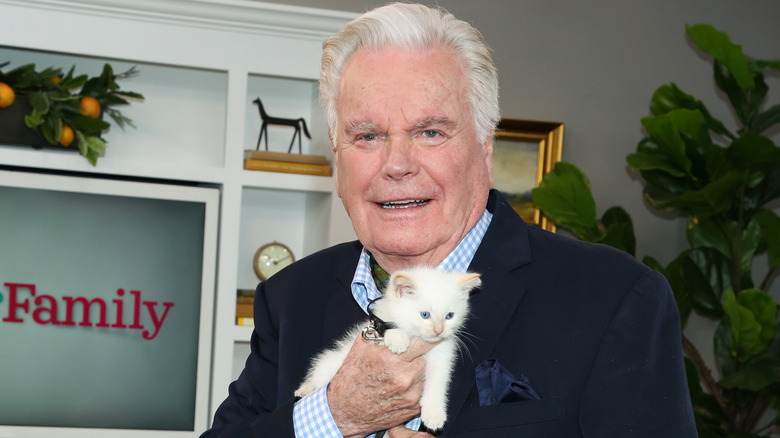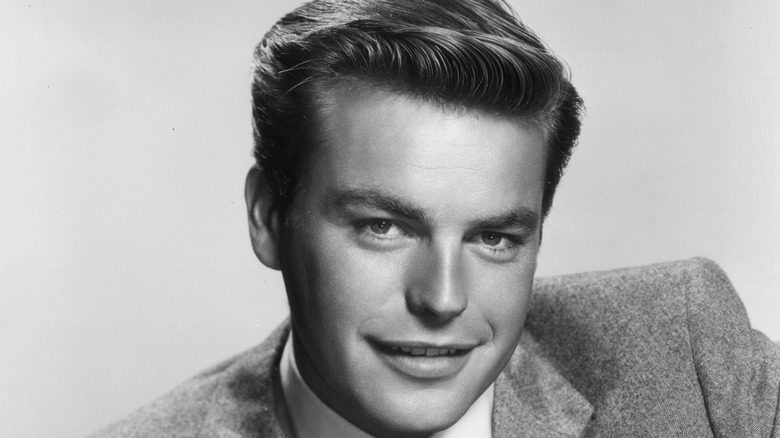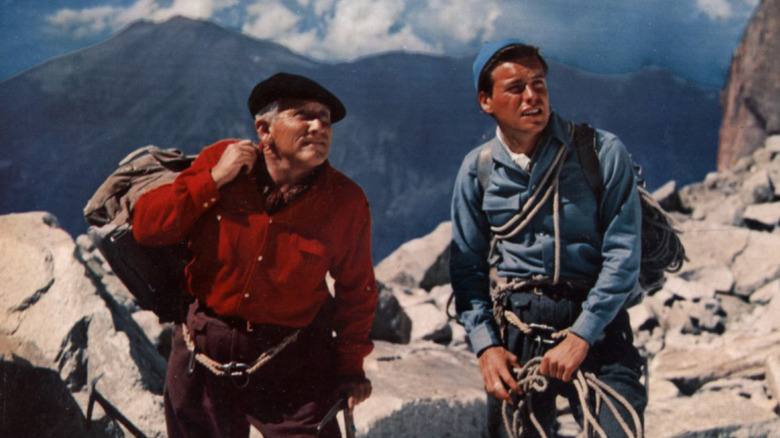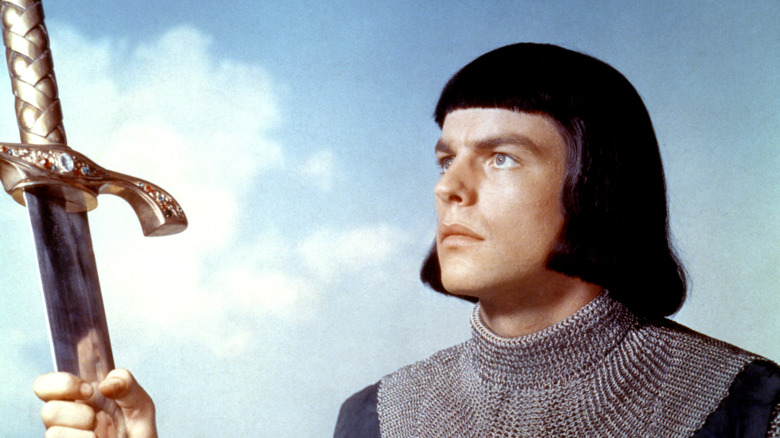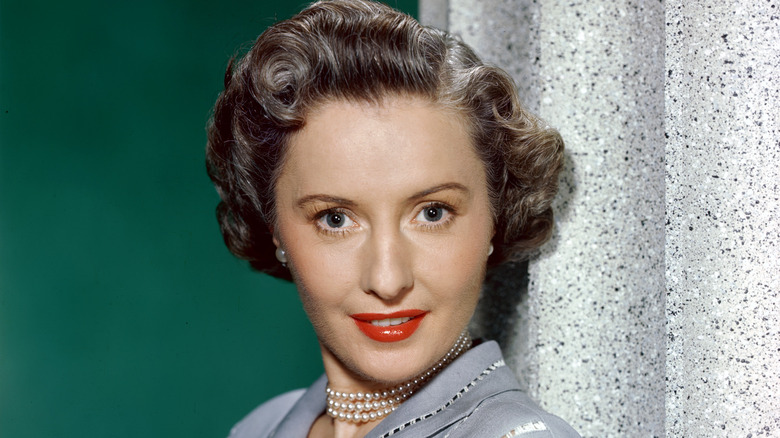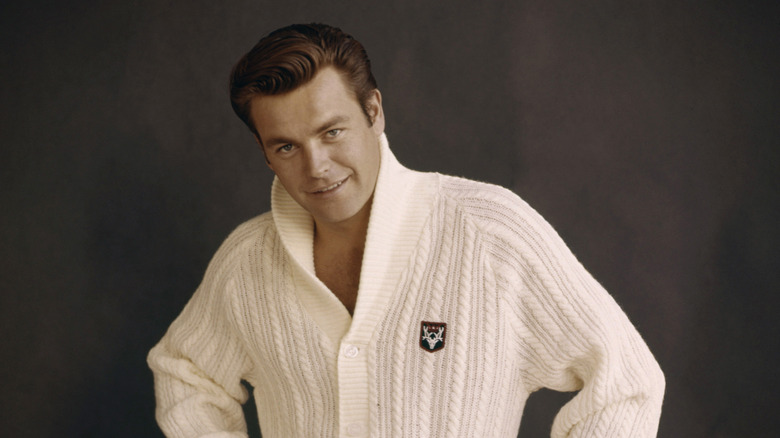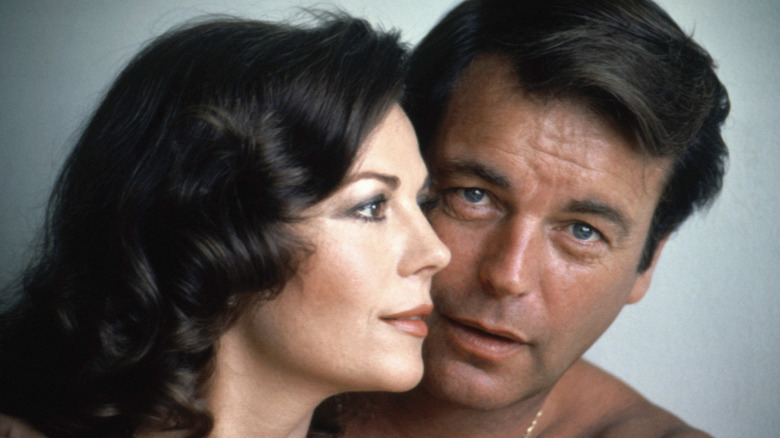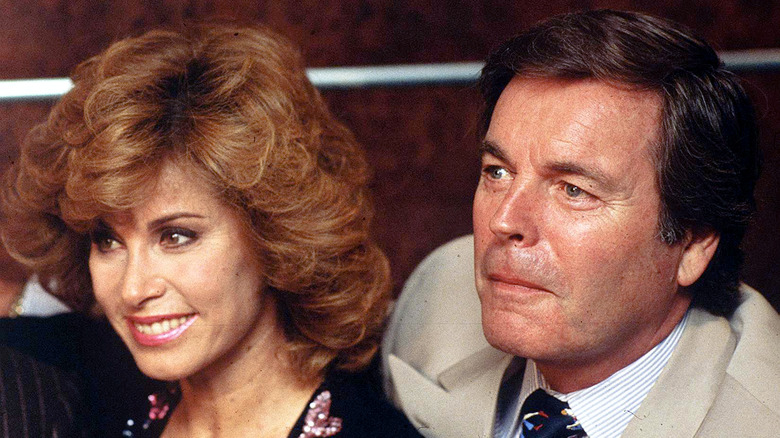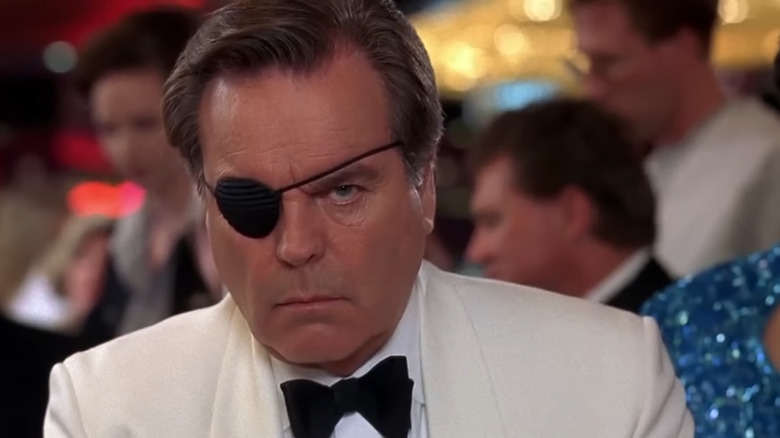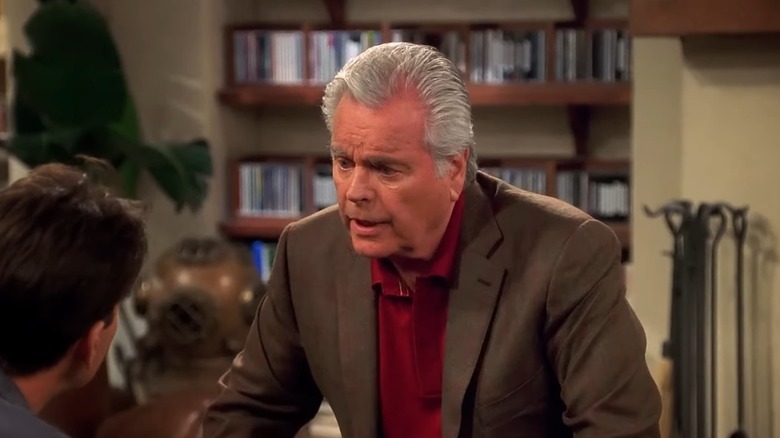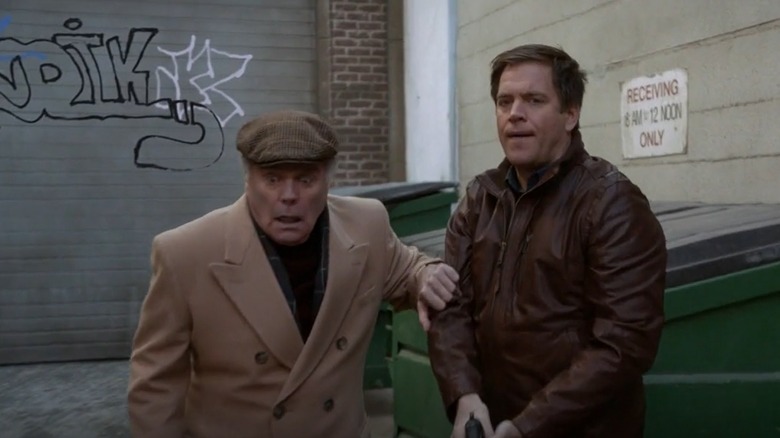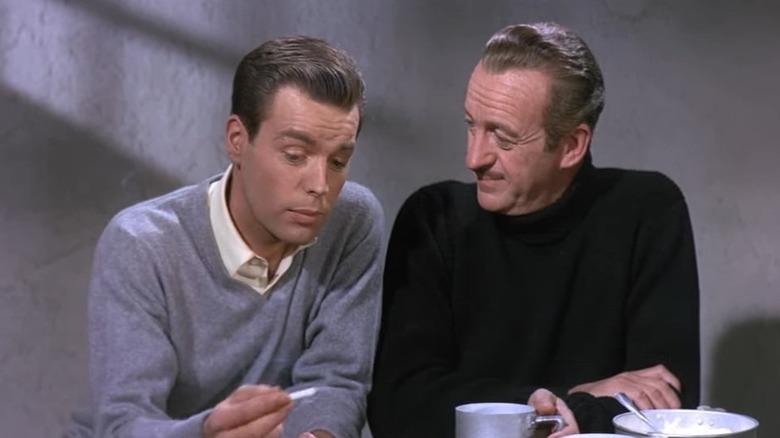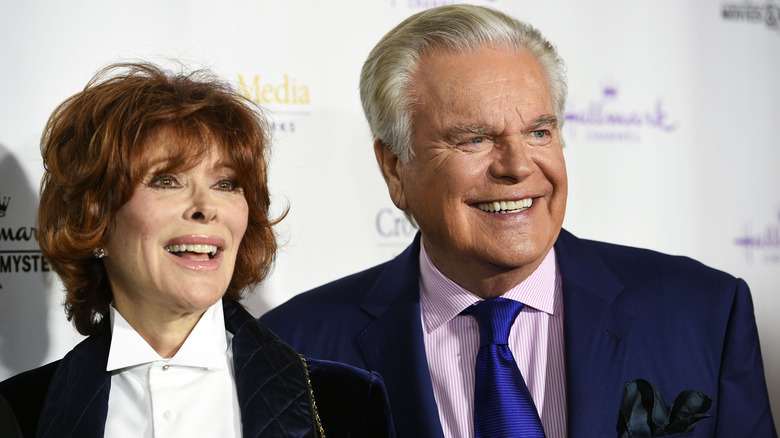Robert Wagner: The Story Of The Hollywood Actor
As one of the last stalwarts of Old Hollywood, Robert Wagner screams "movie star." Trends come and go, but the actor has kept himself relevant and in the conversation across multiple decades. Even when surrounded by modern-day thespians and generational talents, Wagner commands the screen and demonstrates a timeless acting quality that can't be replicated — no matter if he stars in "The Towering Inferno" or "Two and a Half Men." Yet, he never changed his approach to how he portrays himself on and off screen, exuding the air of a suave and sophisticated gentleman with a penchant for the finer things in life.
Behind the camera, however, the actor experienced his share of notorious controversy and scandal in his personal life. From the mysterious death of his first wife, Natalie Wood, to his hush-hush affair with Barbara Stanwyck, Wagner has found himself in the limelight for reasons he may have not wanted to be public in the first place. As time passed, though, he has gone on record to present his own side of the story.
With that said, let's roll back the years and explore the story of Robert Wagner and his rise to becoming a Hollywood superstar.
Robert Wagner's relationship with Irving Thalberg Jr. inspired his interest in acting
Robert Wagner's journey to acting is a story filled with many famous faces, as his interest in the performing arts started at a young age and saw him cross paths with Hollywood's most celebrated icons, often by chance. In conversation with the SAG-AFTRA Foundation, Wagner discussed how he attended boarding school in California and formed a friendship with Irving Thalberg Jr. — the son of the famous producer. On the weekends, they would travel to the homes of different families, and it was during a stay at Thalberg's home that he met Irving's mother and celebrated actor, Norma Shearer, who was starring in "Marie Antoinette" at the time. This introduced Wagner to the world of acting, and he developed an interest in the craft by interacting with Shearer.
In addition, Fred Astaire's son also attended the same school as Wagner, which allowed him the opportunity to stay at the Astaire home. Wagner reminisced about how Astaire picked him up from school and they would later go on to star in "It Takes a Thief" together, where they played father and son on the show.
Robert Wagner cites Spencer Tracy as his mentor
Leading credence to the adage "It's not what you know, but who you know," Robert Wagner's career received a major boost when he caught the eye of one of Hollywood's greatest stars of the Golden Age. As per Digital Journey, Spencer Tracy watched Wagner's performance as Tony Petrakis in 1953's "Beneath the 12-Mile Reef" and was impressed by the young star's first leading performance — so much so that he secured a role for Wagner in the 1954 Western "Broken Lance," where Tracy plays Matthew Devereaux and Wagner portrays his son Joe. Their experience on the film proved to be positive enough that Tracy brought Wagner back for 1956's "The Mountain," where the actors play brothers Zachary and Chris Teller respectively.
Appearing on "Larry King Live" in 2002, Wagner credited Tracy as his mentor and for helping to kick-start his journey in Hollywood. He said: "And when I met Spencer Tracy ... Spence put his arm around me and he said, 'You know, you really got it. You could really go someplace in this business.'" Wagner explained how Tracy gave him co-star billing for "The Mountain," which went a long way in helping to establish him as a star in his own right.
He wasn't a fan of his big breakthrough movie
Robert Wagner's first major blockbuster arrived in the form of 1954's "Prince Valiant." Based on Hal Foster's long-running comic strip of the same name, the picture promised swashbuckling action and adventure as Wagner took on the lead role of Prince Valiant himself. As per Tor, the film was a big deal at the time, as 20th Century Fox secured the rights for the property and invested $3 million in it. While that figure might not even be enough for the costumes in a Marvel film in the modern era, it was a major investment in the 1950s.
Despite having Henry Hathaway as a director and featuring established cast members such as James Mason and Janet Leigh, "Prince Valiant" didn't do well at the box office, and plans for the sequel, "Valiant and Aleta," were quickly canceled after accounting crunched the numbers. Years later, Wagner revealed to interviewer Tom Cottle that a lot of people still bring up the movie to him. "I get a lot of people calling me the Prince, especially in Hollywood," he said, "because I did a picture years ago called 'Prince Valiant.' And it was not a very good movie, and I have taken a lot of bad raps on that picture, so the people always say, 'Hi, how are you, Prince?'"
He had a secret affair with Barbara Stanwyck
Considered a heartthrob by the media and public, Robert Wagner saw his name linked with a plethora of celebrities throughout his career. However, there was one romance that he and his partner kept on the quiet side. As confirmed in his autobiography, "Pieces of My Heart: A Life," which he wrote with Scott Eyman, Wagner dated his "Titanic" co-star Barbara Stanwyck. The actor explained that with Stanwyck being 23 years his senior, they decided to not broadcast their relationship status to the world.
"Because of the age difference, neither of us wanted to have our relationship in the papers, and with the help of Helen Ferguson, [Stanwyck's] publicist and one of her best friends, we kept it quiet," Wagner wrote. "There were only a few people who knew about us."
Wagner stated that Nancy Sinatra Sr. was aware of their romance, as was Spencer Tracy. He also suspected a few others knew about them but never said a word about it. Wagner explained how he had to keep up a charade of dating other women because the studio wanted to present him as a ladies' man. However, he said it was all for show, as he was loyal to Stanwyck.
He credits 20th Century Fox for his success
The stories of Old Hollywood in the 1940s and 1950s have become the stuff of legend. With so many cinema classics and movie stars being made in the era, most people look back on it as the peak of the entertainment industry. Having lived through the boom and been a part of it, Robert Wagner told the Los Angeles Times it was a special period both in terms of Hollywood's success and his own life.
He explained how being a part of 20th Century Fox's studio system helped him immensely, as he signed up with the studio from the age of 18 until he turned 30 and always felt at home there. Wagner added how Fox invested in its talent, starting a film school and providing coaches for its performers to sharpen their skills and improve.
That said, Wagner acknowledged that he was expected to abide by the studio system and follow its rules. "You played the game," he stated. "You were a property. You were someone they were grooming. You were protected. Motion-picture actors and actresses were thought of as royalty, and to be taken into that fold and to be nurtured by those people was wonderful."
The much-discussed death of Natalie Wood
Questions about Natalie Wood's death remain predominant to this day. Much has been debated about what happened on the evening of November 28, 1981, though there are certain facts that everyone agrees upon. Actor Christopher Walken joined Robert Wagner and his wife, Natalie Wood, aboard their boat that Thanksgiving weekend. The next morning, her body was found in the water after she drowned, while a dinghy was discovered nearby. There were bruises and marks on her body.
Officials deemed it an accident; however, the ship's captain, Dennis Davern, opened up about his version of events in 2018. Appearing on "Megyn Kelly Today" (via The Hollywood Reporter), Davern claimed that Wagner pushed Wood off the boat, leading to her drowning. In a podcast, the captain also stated that Wagner effectively kept him "hostage" for over a year to prevent him from speaking to others about what had taken place.
Speaking to the Los Angeles Times, Wagner denied having any involvement in Wood's death. He explained how he and Walken had argued on the boat about an acting-related topic, while Wood decided to go to the bathroom. When Wagner went to bed, Wood wasn't there. Wagner suggested that Wood must have spotted the dinghy that had come loose and tried to tie it back, leading to her falling overboard — explaining the bruises and marks — and drowning.
Robert Wagner was disappointed by the cancellation of Hart to Hart
From 1979 to 1984, the television mystery series "Hart to Hart" delighted audiences for five seasons. In the show, Robert Wagner plays Jonathan Hart, while Stefanie Powers portrays his wife, Jennifer. The couple travels around the world in luxury and style, but end up being drawn into crimes they must solve. After the series' cancellation, the story continued through eight television movies.
Despite receiving five seasons on air, Wagner wasn't happy with how the axe came out of nowhere. "I was very disappointed at the cancellation of 'Hart to Hart,'" he told The Washington Post in 1985. "We'd been together so long. I mean, Stefanie and I had even picked the wallpaper for our TV living room. What really upset me was that [the execs] waited until the last minute to do it."
Nearly four decades later, Wagner praised "Hart to Hart" and how it continues to have a loyal fan base. He explained to Decider that both he and Powers are appreciative of the audience's affection and passion for the show, and both actors relished in making a series that has stood the test of time. He also revealed that he and his co-star have stayed in touch.
He loved his role in Austin Powers
Throughout his glittering career, Robert Wagner never shied away from diversifying his filmography or stepping into unexpected territory. He demonstrated his comedic chops as George Lytton in the "Pink Panther" series, and he returned to the genre in the "Austin Power" films. In the movies, Wagner plays Number Two — Dr. Evil's sycophantic henchman and second in charge. The series isn't afraid to get slapstick and silly, with Wagner being in on the joke and hamming it up when necessary.
Speaking on "Larry King Live," Wagner explained how he enjoyed the experience of working on "Austin Powers," equating it to how much fun he had filming "The Pink Panther." He added that the opportunity came about after he met Mike Myers, who created the "Austin Powers" story and stars in the films, on an episode of "Saturday Night Live." The pair clicked right away, and it led to Myers reaching out to Wagner with a proposal later.
"He wrote the part of Number Two for me and sent me the script, and he said, 'I wrote this part for you and I want you to play it,'" Wagner stated. "And I said, 'Oh, Mike, this is wonderful.'"
The real reason he left Two and a Half Men
In the final episode of "Two and a Half Men" Season 4, "Prostitutes and Gelato," Evelyn Harper (Holland Taylor) introduces her sons, Charlie (Charlie Sheen) and Alan (Jon Cryer), to her new beau Teddy Leopold (Robert Wagner) and everyone falls for his charm. Teddy appears throughout Season 5, where it's finally revealed he is a conman named Nathan Krunk who wants to scam Evelyn. In the end, Nathan dies after having a heart attack during sexual intercourse, and his secret life is exposed.
The storyline played a major part in the Season 5 arc of the show, but considering Wagner's chemistry with his co-stars and comedic timing, it was surprising that he didn't receive a longer stint on the sitcom. Speaking to the Los Angeles Times, Wagner revealed the choice was out of his hands. "I loved doing that show," he said, "but they decided to get the guest artists out of the show and go back to the original [format]." Despite admitting his sadness about his time on the series coming to a swift end, he joked about how his character's sexually charged death was a fantastic way to write him out of "Two and a Half Men."
He credits Michael Weatherly for his NCIS role
For nine years, Robert Wagner appeared on the police procedural "NCIS," where he played Anthony DiNozzo Sr. — the father of NCIS Agent Tony DiNozzo (Michael Weatherly). Wagner left the series mostly due to the producers being concerned about the health risk associated with his advancing age and having him travel during the COVID-19 pandemic.
Appearing on "The Talk," Wagner discussed how he came to be cast as Tony's father on "NCIS" in the first place. The actor explained how Weatherly had played Wagner in the 2004 two-part television film "The Mystery of Natalie Wood" then suggested Wagner to play the role of his father in "NCIS."
"He's a wonderful young man, and he suggested that I be his father," Wagner said. "And of course, I knew Mark [Harmon] quite well, and I met the producers and the writers, and they said, 'Yeah, let's go.' So, it was terrific and I loved doing it."
Robert Wagner's favorite Robert Wagner film is The Pink Panther
From starring alongside Steve McQueen and Paul Newman in "The Towering Inferno" to sharing top billing with Spencer Tracy in "The Mountain," Robert Wagner has an embarrassment of riches to pick from when choosing his own favorite film. However, there's one 1963 classic that stands head and shoulders above the rest for the actor.
Speaking to Palo Alto Weekly in 2013, Wagner explained how "The Pink Panther" remains his top choice for his favorite project and how the production proved to be a terrific experience — from teaming up with Peter Sellers to working with director Blake Edwards. However, there was one incident that left him in a significant amount of pain for a few weeks and concerned if his vision would ever be the same again.
In one of the film's bath scenes that Wagner's character, George Lytton, shares with French actress Capucine's Simone Clouseau, both actors were burned by the soap suds. "The results of that were very frightening because I'd burned the corneas of my eyes and I was blind for three weeks," Wagner said, adding that the producers considered replacing him in the film after the accident; however, his co-stars and director fought to keep him on and to make a plan while his eyes healed.
Robert Wagner has a special fondness for Aspen
As Robert Wagner's career winds down, he now finds himself spending more time at home. In his memoir "Pieces of My Heart: A Life," the actor revealed how he and his wife, Jill St. John, have a home in Aspen, Colorado, as well as a condo in Los Angeles, California. However, Aspen is the place Wagner truly considers home.
He revealed how his wife had lived in the former mining town for many years before they officially got together as a couple. After he met her, his affection for Aspen grew as well, thanks in part to the beauty of the mountain scenery. Wagner and St. John married in 1990, then bought a house in the town in 1995.
Wagner also mentioned that he plans for Aspen to be his final resting place when he dies. He wrote: "When my time comes, I will be buried in Aspen, in an old cemetery that was originally laid out in the nineteenth century."
